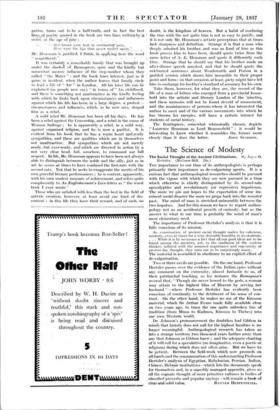The Science of Modesty
THE importance to our time of its anthropologists is perhaps primarily their importance as de-vulgarising agents. It is a curious fact that anthropological researches should be pursued with the vigour with which they are now pursued in a time which otherwise is chiefly distinguished by its second-rate apocalyptics and revolutionary (or regressive) impatience.
The more we pin our hopes to the expectation of some im- minent social disaster the more we grope back into the remoter past. The mind of man is stretched unbearably between the two impulses. And for- this reason we have - to regard anthro- pology not as an accidental growth of curiosity, but as the answer to what in our time is probably the mind of man's most elementary need.
The importance of Professor Hertzler's analysis is that it is fully conscious of its mission.
An examination of ancient social thought makes for calmness, modesty, even at times for a very desirable humility in its students. . . . While it is by no means a fact that all our good ideas are to be found among the ancients, yet, to the confusion of the modern thinker, inflated with the assumed importance and superiority of present-day thought, they turn out to be surprisingly many.
The material is assembled in obedience to an explicit effort of
de-vulgarisation.
Two or three cavils are possible. On the one hand, Professor Hertzler passes over the evidence of the Indian epics without any comment on the extremity, almost fantastic to us, of their patriarchal teaching, as for instance the Ramayana's
avowal that, " Though she never bowed to the gods, a woman may attain to the highest bliss of Heaven by serving her husband "—where Professor Hertzler has evidently been conscious of continuity to the detriment of his sense of con- trast. - On the _other hand, he makes no use of the Knossos material, which Sir Arthur Evans made fUlly_available close on two years ago, to trace the one miite unbroken line of tradition (from. Minos to Kadmos, Knossos to Thebes) into our own Western world.
Dr. Johnson's pronouncement (he -doubtless had Gibbon in
mind) that :history does not call for the highest. faculties is no longer meaningful. Anthropological research has taken us into a strange territory two thousand years farther away than any that Johnson or Gibbon knew ; and the adequate charting- of it will call for a speculative (an imaginative, even a poetic or- religious) daring which does not often arise. But we have to: he patient. Between the field-work which now proceeds on: all hands and the consummation of this understanding Professor Hertzler's analysis of Egyptian, Babylonian, Persian; Indian, Chinese, Hebraic institutions—which lets the documents speak for themselves and, in a superbly managed appendix, gives us all the cognate thought of more primitive cultures in bodies of classified proverbs and popular sayings—will remain a book of






















































 Previous page
Previous page